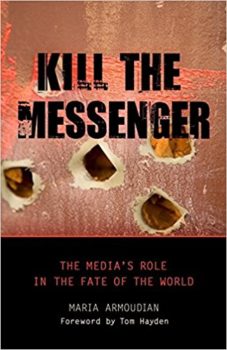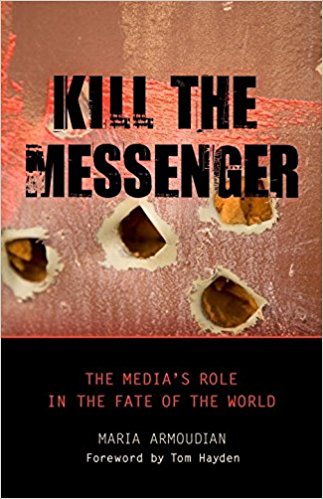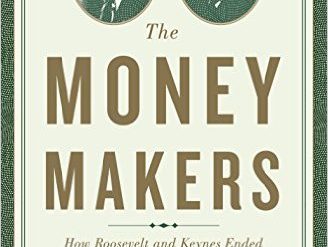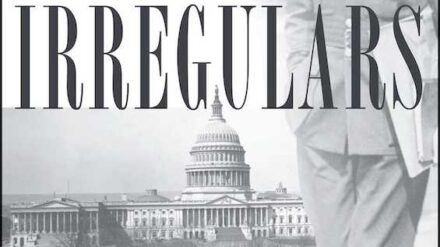
The emergence of mass society was one of the defining characteristics of the 20th Century. Enabled by population growth, industrialization, urbanization, rising rates of literacy, and advances in transportation and communications, mass society became a reality for growing numbers of people in more and more far-flung regions of the planet as the century unfolded.
In turn, mass society facilitated the growth of Communism, Fascism, and other varieties of authoritarianism. Among the less extreme effects of this new phenomenon in human affairs were the advent of “public opinion,” the globalization of fashion, and the rapid development of important new industries such as advertising, public relations, and broadcast journalism. The “mass communications” we have taken for granted for so many years now were, properly speaking, an artifact of the 20th Century.
Kill the Messenger: The Media’s Role in the Fate of the World by Maria Armoudian ★★★★★
In Kill the Messenger, political scientist and radio broadcaster Maria Armoudian ably examines the central role of mass media in human affairs over the course of the century. Through brief case studies of events in Nazi Germany, Rwanda, and the former states of Yugoslavia, she explores the influential — and perhaps essential — function of the media as an enabler of genocide. Armoudian shows how authoritarian regimes in South Africa, Chile, Taiwan, and Burundi made similar efforts to harness the media to help promote the murder, torture, and imprisonment of their own citizens but with much more mixed results.
In South Africa, for example, she reveals how new attitudes in the news media helped bring about a largely peaceful conclusion to the era of apartheid. However, Kill the Messenger is about mass media’s place in society, not just its relationship with governments. Armoudian’s examination of public opinion about climate change demonstrates the huge impact of relatively minor investments in media by Exxon Mobil, the Koch Brothers, and other naysayers.
An analysis based on “framing”
Armoudian puts to work the linguistic concept of “framing” throughout the book, showing, for example, how climate change deniers managed to persuade the mass media to present the issue as open to debate. This frame (“debate”) has dominated coverage not just on Fox News but on most other television and radio networks as well. Similarly, frames (“blaming” and “heroes-versus-villains”) dominated news coverage in countries where genocide became generally accepted.
Kill the Messenger is an important book because it squeezes between two covers a collection of observations and insights about many of the seminal events of the 20th Century, rendering the history of mass society understandable through the lens of mass media. However, it remains to be seen how much longer Armoudian’s analysis will help illuminate events in the future. The emergence of new communications technologies revolving about the Internet may have thrown a monkey wrench into the phenomenon of mass media. It’s far too early to tell.
This fascinating book would have benefitted from a better publisher than Prometheus Books. The text is rife with glaring typos that even a cursory proofreading would have caught. The cover art is uninviting, an unfortunate sign that Prometheus Books either doesn’t know or doesn’t care how to market a book of this significance.
For related reading
Like to read books about politics and current affairs? Check out Top 10 nonfiction books about politics.
If you enjoy reading nonfiction in general, you might also enjoy:
- Science explained in 10 excellent popular books
- 10 great biographies
- Top 10 nonfiction books about politics
And you can always find my most popular reviews, and the most recent ones, on the Home Page.


























